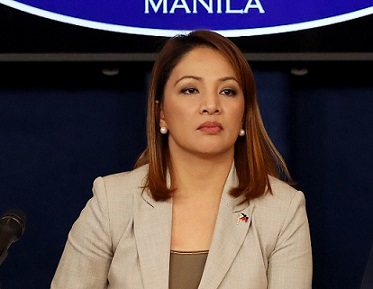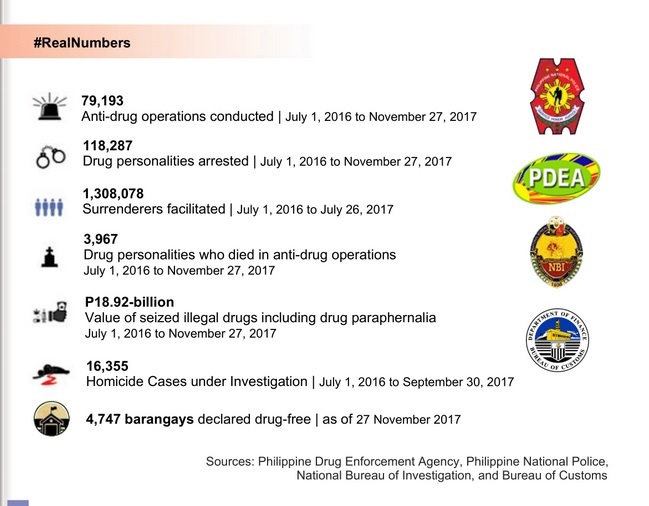If the objective of the #Real Numbers press conference last Thursday organized by the Presidential Communications Operations Office was to clarify about the conflicting numbers related to President Duterte’s drug war, it left us more confused.

It’s difficult to believe her assertion because in the Duterte government’s 2017 Accomplishment Report, under the section “Fighting Illegal Drugs,” it listed 3,967 “drug personalities who died in anti-drug operations” from July 1, 2016 to November 30, 2017 and 16,355 “homicides under investigation” from July 1, 2016 – September 30, 2017.
The Supreme Court, in an April 2018 resolution, even underscored this saying, “This is a total of 20,322 deaths during the Duterte Administration’s anti-drug war from July 1, 2016 to November 27, 2017, or an average of 39.46 deaths every day. This Court wants to know why so many deaths happened as expressly reported under the section “Fighting Illegal Drugs” of the Duterte’s Administration 2017 Yearend Report.”
There was no reported denial or explanation from the PCOO to correct the High Court’s interpretation of the numbers in the Duterte government’s accomplishment report.

In last Thursday’s presscon, VERA Files’ Celine Samson asked how do they define “drug personality.”
PNP deputy spokesperson Lt. Col. Kimberly Molitas replied: A drug personality “is someone involved in the selling, use, trade, the maintenance of a drug den. Trade, sell, protection of a personality who is involved in drugs. The user.”
Banaag was asked by Reuters, how did they classify 17-year old Kian de los Santos, who was killed during police operations in Caloocan City on August 16, 2017?
Banaag said the killing of Kian which was caught on CCTV is under “homicide under investigation.”
This was just a few minutes after she said “HCUIs are not at all related to the war on drugs.”
There was also a question about three-year old Myka Ulpina, who was killed during police anti-drug operations in Rodriguez, Rizal early this month.
Molitas replied, “So of course the child, the three year old that you are talking about is a totally different situation. She was caught in a crossfire. It’s a totally different situation altogether.”
If HCUIs have nothing to do with illegal drug operations, why was it under the section of “Fighting Illegal Drugs”?
Banaag blamed it on the one who prepared the Accomplishment report who, she said, just did “copy and paste.” Here’s her explanation:
“So, I explained it a while ago that in 2017, we wanted to differentiate HCUI from deaths during anti-illegal drugs operations. Thus, that is included in our report and that’s the Real Numbers data. That’s a social card that is attached or pasted in our yearend report. And we’ve been using that then because we wanted to clarify the numbers being pushed by some political interest groups who wanted to go to the UN and talk about their own numbers.
Told that nothing in the Accomplishment Report stated that HCUI figures under “Fighting Illegal Drugs have nothing to do with illegal drugs, Banaag said, “Because it is a social card that was published by Real Numbers that’s included in our year-end report. It was not typed as part of our year-end report; it is a social card of Real Numbers.”
Reporters didn’t let Banaag off the hook because in the ambush interview they pursued the issue of “copy and paste”. Here’s her answer:
“Diba Real Numbers is part of the accomplishment? So, they got this one (the Real Numbers social card) and pasted it there. So, it was not something that was really typed. Na as part of our accomplishment, we have identified HCUIs? No, no it’s not. They got the social card and pasted it in our yearend report.
Reporters further asked: Even if it’s under the illegal drugs?
Banaag replied: Because that’s a social card. It’s like they got this one (points to press release) and pasted it there because Real Numbers is PCOO’s. It’s a social card that we also published in 2017 so they just got it. We also made our report, got that, and pasted it in our report.
“They got this social card and pasted it there. That’s just what happened. It’s not really something that we typed that this was part of our accomplishment. No, not at all.”
We will let Banaag be with her social card, copy and paste narrative.
Why do we insist on correct numbers?
Because every number in Duterte’s campaign against illegal drugs – killed during police operations or in other circumstances – represents a human being who was deprived of his life without due process of law.
Be First to Comment